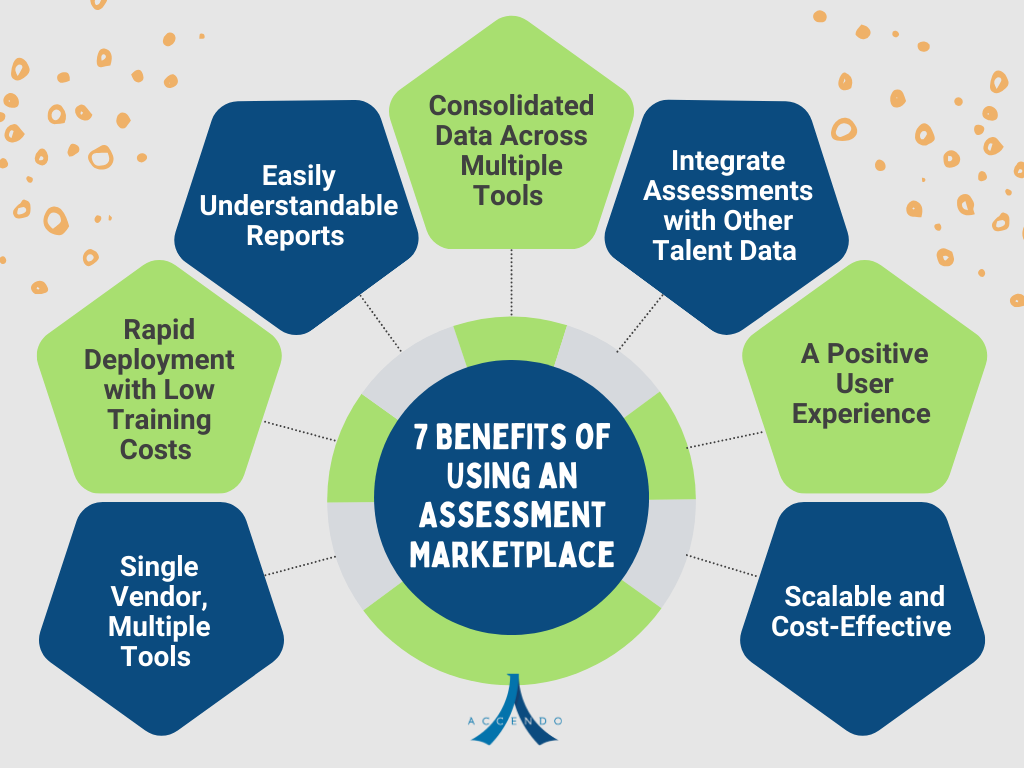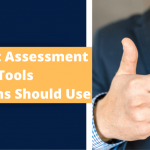Looking to streamline your talent assessment processes? Discover the benefits of an assessment marketplace – a centralised platform for talent assessment tools. Our blog explores why it is crucial for HR teams in today’s job market, and how it helps with consolidation, integration, and scalability. Adopting this approach allows HR teams to scale their use of assessments and say goodbye to the usual operational challenges.
The Power of an Assessment Marketplace

Organisations today heavily depend on talent assessments to help them assess their candidates’ skills, competencies, and cultural fit. Additionally, these assessments help identify areas for employee growth and development.
However, for HR professionals, the sheer number and complexity of talent assessment tools available can be daunting.
An assessment marketplace can be useful in this situation. It’s a centralised platform that offers a curated selection of talent assessment tools. This makes it easier for companies to choose, integrate, and manage their assessment processes.
The Current Reliance on Assessments
Companies today use talent assessments at various stages of the employee lifecycle.
- During the hiring process, assessments help with the talent acquisition strategy to filter out unfit candidates. This ensures that only those who meet the requirements proceed to the further stages.
- After the onboarding process, assessments continue to play a critical role. They’re used to identify training needs, career development planning, and succession management.
However, the landscape of talent assessment tools is both diverse and complex. The market is flooded with a wide array of assessments, each varying in terms of methodology, focus, and application:
- Cognitive assessments
- Psychometric assessments
- Skills assessments
- Situational judgment tests
- Emotional intelligence tests
- Cultural fit assessments
Challenges HR Teams Face Due to Multiple Assessment Tools
Choosing a poor combination of tools can be daunting for HR professionals and can lead to challenges such as:
Complexity and Inefficiency
Each talent assessment tool comes with its features, methodologies, and application processes. All these require significant time and effort to understand and implement effectively. As a result:
- HR spends excessive time selecting and managing tools rather than focusing on strategic talent development.
- This can cause fragmented and inconclusive assessment data, making it difficult to draw meaningful insights and make informed decisions.
Data Fragmentation and Integration Issues
Each talent assessment tool generates its own set of results and may not be easily integrated into other tools or the company’s existing HR systems. This can cause data fragmentation to occur. As a result:
- Companies are unable to get a holistic view of an individual’s skills, strengths, and development needs.
- Integration issues can lead to inconsistent data formats, duplication of efforts, and gaps in the assessment process.
User Experience and Scalability
Different assessment tools require separate user interfaces and workflows, creating a cumbersome experience for both HR and employees. As companies grow, scalability becomes increasingly difficult without a standardised approach. As a result:
- Poor user experience leads to lower engagement and participation in the assessment process.
- Managing multiple tools can become overwhelming and unsustainable as the company scales.
The Benefits of Using an Assessment Marketplace
Here’s how an assessment marketplace can help HR teams overcome these challenges and enhance their talent management strategies.

Single Vendor, Multiple Tools
Companies often struggle with sourcing vendors and finding the right talent assessment tools to onboard. An assessment marketplace solves this by:
- Operating as a single vendor for multiple tools
- Acting as a single procurement process
- Optimising training time and costs
- Automating data consolidation and other talent scores
- Churning out easy-to-understand reports
- Efficiently deploying assessment tools
- Enhancing the candidate experience
Think of it as a treasure trove of assessment types, all under one roof.
Rapid Deployment with Low Training Costs
An assessment marketplace acts as a curated platform of a variety of pre-qualified assessment tools where:
- Companies can spend less time and resources sourcing for vendors specialising in the relevant tools.
- They can easily compare different talent assessment tools and select the best fit based on their requirements.
Technical issues and a lack of understanding of the process can also cause significant delays in deployment. An assessment marketplace has a team of experts who can provide training, guidance, and support, including designing assessments, analysing data, and interpreting results across all tools.
Easily Understandable Reports
Interpreting reports with varying formats, terminologies, and benchmarks can lead to difficulties in making meaningful analyses. Yet, it’s these reports where companies can gain insights into employee aspirations, personality, cognitive abilities, motivations, and other critical details.
An assessment marketplace eliminates the headache of manually report consolidation and interpreting them through:
- Data consolidation from various talent assessment tools into a single, easily digestible report.
- Intelligent algorithms combine each tool’s data to produce an accurate score interpretation.
Consolidated Data Across Multiple Tools
Time is a precious commodity. Picture this scenario:
A hiring manager may require results from a psychometric, a case study, and a simulation to assess high potential. To assist with this, HR teams must manually combine the different scores and analyses into a consolidated document. To enable this process, HR teams would need to do the consolidation on a spreadsheet, a document, or a presentation.
These are additional tasks for HR teams to deal with because of the various tools used in the process. An assessment marketplace has a built-in output engine that saves time by automating the data consolidation to churn out one single, comprehensive report.
Integrate Assessments with Other Talent Data
Assessments provide HR teams with holistic insights into an employee’s strengths, weaknesses, and potential areas for growth.
- Integrating these data along with other relevant talent scores can create a full picture of each employee’s potential.
- This can lead to better performance evaluations, promotions, and career growth and development.
Companies incorporating talent assessments into their learning and development process have reported:
- Improvements in hiring
- Reduced turnover
- Happier and more productive employees
A Positive User Experience
With this diverse range of features offered by an assessment marketplace, it’s no secret that it can promote a rich experience for its users.
- Employees gain objective evaluations and tailor their personalised development plans to help them achieve their career goals.
- Employers can use the data-driven insights to identify their superstars, match them to their roles, and track their progress.
Scalable and Cost-Effective
The ability to select and adopt additional assessment tools from the marketplace eliminates the need to renegotiate contracts or establish new vendor relationships. This allows companies to stay agile and responsive to their changing assessment needs.
In addition to its scalability, an assessment marketplace offers significant cost savings for companies.
- Companies can negotiate better pricing and terms for a range of assessment tools with one vendor instead of multiple individual providers.
- This approach not only saves time but also reduces costs associated with multiple vendor management, training, and licensing.
If your HR team is struggling with the inefficiencies and complexities of managing multiple talent assessment tools, it’s time to consider a more streamlined solution. Accendo’s Assessment Marketplace consolidates various assessment tools on a single platform by:
- Simplifying your processes
- Reducing the time spent on vendor management and data integration
- Enhances the user experience
- Provides comprehensive insights for more informed decision-making
Conclusion
Adopting an assessment marketplace can streamline talent management framework by centralising various tools, addressing challenges like complexity and data fragmentation. This approach enhances efficiency, reduces costs, and provides comprehensive insights into the talent pool. HR teams can make data-driven decisions and stay competitive.
Page Contents






